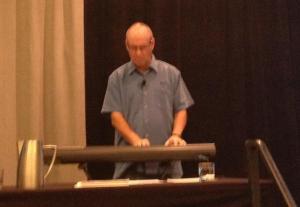By Kelly April Tyrrell
Let words collide.
Float like a butterfly, sting like a bee. Jesus wept. The queen, my lord, is dead.
Collision is power and power rests in brevity.
This was the message journalist and teacher Roy Peter Clark delivered to attendees over the course of a winding ride at a ScienceWriters2013 session on Nov 2.
Clark whipped the audience around each new turn just before they could make out the destination ahead. That is, until things came to rest and he and the audience ended up right where they started.He began on an electric piano, using music to explain how complexity can be broken down into a series of steps within a process. A sequence of notes can build to become a rolling chord, a story.
Clark then jumped to the Three Stooges, asking the audience to do a move once used to annoy parents everywhere, the snap-snap-clap. The audience struggled until he slowed it down, explaining each step.
Soon, the audience was snap-snap-clapping in near unison.
As a writing teacher and senior scholar and vice president of the Poynter Institute of Media Studies, Clark has written several books on the power of good writing and on the tools to achieve it.
“Writing is not magic,” he said.
His focus revolved around the idea of writing short. More and more, writers are limited to shorter pieces, forced to create emphasis in the shortest space possible. And even when they’re not, there is power in writing short.
“When people write short, with the slightest description, people tend not to doubt it,” Clark said.
He used the famous line juxtaposing floating butterflies and stinging bees, the two simple words that illuminate Jesus as both human and divine and the critical element of word order — as used by Shakespeare — to illustrate tools for creating powerful writing.
Along with Cassius Clay, he channeled the artistry of Billy Joel and the world-changing discovery of Peter Higgs in describing his inspiration to study and preach these tools.
Joel represented the essence of the creative process and how the simplest change in structure can change completely the tone and effect of a piece. Higgs and his boson stood for the unseen elements in writing that make all the tangible difference.
Clark left the audience with these final words of wisdom: “Use shorter words. Shorter sentences. Shorter paragraphs. At the points of greatest complexity.”
Also see: Storified tweets from this session.




